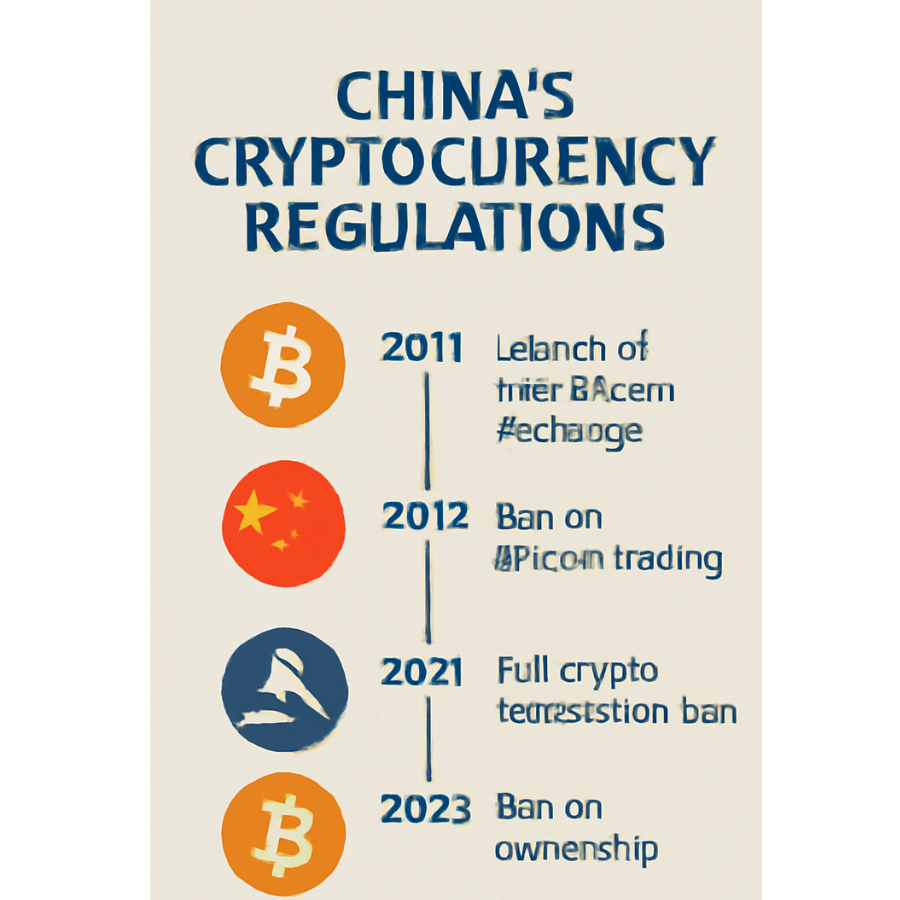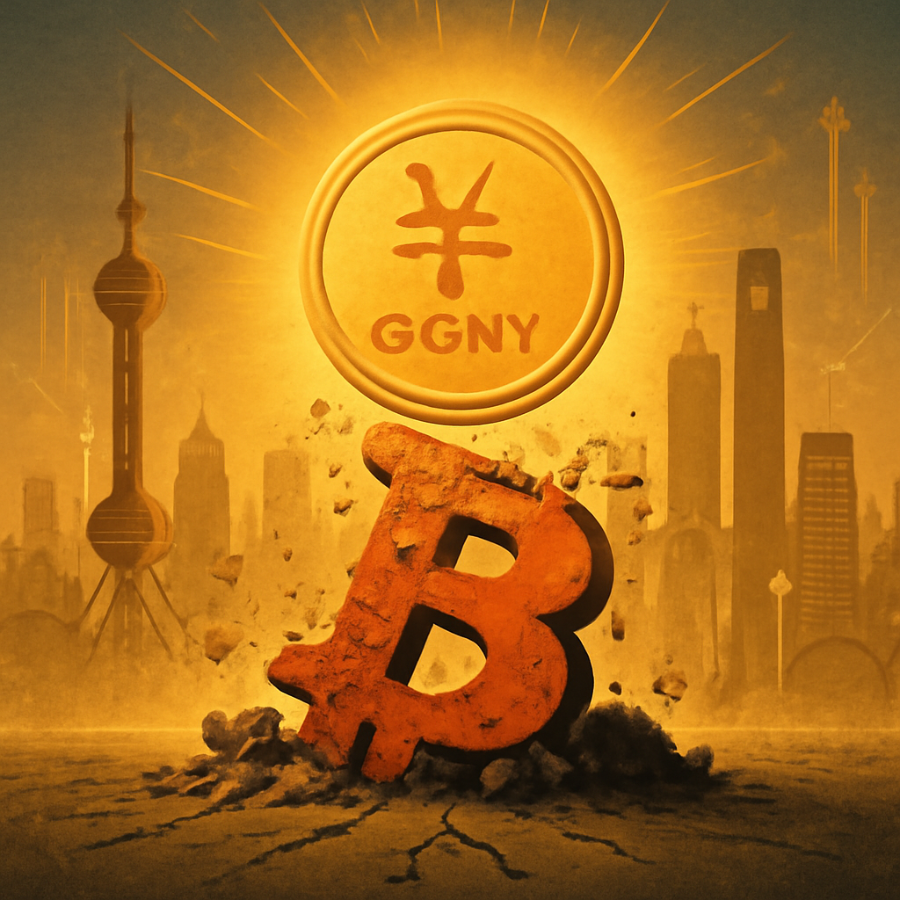Now Reading: China Crypto Ban 2025: Bitcoin Ownership Outlawed. What It Means for You and the Future of Crypto
-
01
China Crypto Ban 2025: Bitcoin Ownership Outlawed. What It Means for You and the Future of Crypto
China Crypto Ban 2025: Bitcoin Ownership Outlawed. What It Means for You and the Future of Crypto

China crypto ban 2025 has become one of the most talked-about events in the cryptocurrency world. In late May 2025, China introduced its harshest cryptocurrency crackdown yet, making it illegal not only to trade but even to own Bitcoin and other digital assets”bitget.com.”

This China bans Bitcoin ownership directive marked a new chapter in China’s crypto regulation, sending shockwaves through global markets. The government’s move came amid rising concerns about capital flight and a strategic push for its own digital currency. In this article, we delve into the background of China’s crypto bans, the specifics of the 2025 ban, the motivations behind it, and the effects on Bitcoin and the wider crypto market.
A Brief History of China’s Cryptocurrency Crackdown
China’s crypto policy has long been among the strictest in the world. Over the past decade, Beijing has repeatedly tightened the rules on Bitcoin and other digital currencies. Early on, China enthusiastically embraced crypto launching the first Chinese Bitcoin exchange in 2011 and becoming a global center of mining thanks to cheap electricity”investopedia.com“. However, regulators soon grew wary of cryptocurrencies:
- 2013–2017: The People’s Bank of China (PBOC) began curbing crypto use. In 2013, banks and financial institutions were ordered to stop handling Bitcoin transactions”weforum.org“. In 2017, China banned Initial Coin Offerings (ICOs) and forced local exchanges to shut down, citing concerns over speculation and fraud”investopedia.comreuters.com“.
- 2021: The crackdown escalated. In September 2021, China’s regulators (including the PBOC and securities authorities) issued a blanket ban on all crypto transactions and mining”reuters.com“. The government mobilized multiple agencies to “root out illegal cryptocurrency activity” nationwide”reuters.com“. This ban forced major exchanges like Huobi and OKCoin to close and drove miners overseas”investopedia.com.” The PBOC openly stated that cryptocurrencies “must not circulate,” warning that virtual assets could disrupt the economic and financial order”reuters.com“.
- Digital Yuan Pilot: Alongside these bans, China quietly launched a digital yuan (digital RMB) pilot program, positioning its central bank digital currency (CBDC) as the only legal digital currency in China”reuters.combitget.com.”
These measures reflect China’s broader policy of strict capital controls and financial stability. As the World Economic Forum notes, the 2021 ban was justified by concerns that cryptocurrencies facilitated financial crime and capital flight, bypassing China’s limits on foreign exchange”weforum.orgweforum.org.” China’s history shows a pattern of escalating measures whenever crypto seemed to threaten its monetary system.
China Crypto Ban 2025: Key Details and What’s Now Illegal
The 2025 ban took China’s crypto restrictions to the next level. According to reports in late May 2025, Chinese authorities announced a sweeping new law that explicitly outlaws private ownership of all cryptocurrencies“idnfinancials.comfinancialexpress.com“. In practical terms, individuals and companies in China can no longer legally hold Bitcoin, Ethereum, or any crypto token on their wallets or accounts. The ban goes beyond earlier rules:

- Ownership Prohibition: Previous rules banned trading and mining, but this law makes mere ownership illegal”financialexpress.com“. It covers all domestic and foreign cryptocurrencies, even if held on offshore platforms.
- Enforcement: Regulators warned that all “common workarounds” will be closed. Chinese citizens are barred from accessing crypto exchanges, and anyone caught in violation could face legal consequences. Industry sources say the ban was announced around May 30 – June 3, 2025, initially via a report from Binance (a major crypto exchange) on its official channel, and confirmed by state media”idnfinancials.comfinancialexpress.com“.
- Global Scope: Notably, the ban targets offshore activity: Chinese nationals cannot use foreign exchanges or services to circumvent the law. This signals a tight clampdown on crypto into every corner of the Chinese economy”bitget.com.”

By abolishing personal crypto holdings, China sends a clear message: cryptocurrency participation is officially illegal. As one analysis put it, this is a “complete wipeout” of digital asset ownership in the country”tnj.com“. The announcement was covered by major financial outlets and immediately sparked market reactions around the world.
China Cryptocurrency Crackdown: Why Is Crypto Being Replaced by the Digital Yuan?
China’s justifications for this comprehensive ban echo long-standing policy goals. Key motivations include:

- Capital Controls: China maintains strict limits on money leaving the country. Regulators fear that crypto could be used to bypass these controls. As the World Economic Forum explains, cryptocurrencies enable capital flight by making it easier to move wealth out of China”weforum.org“. For years, rich Chinese citizens have sought ways to transfer value abroad, and legal crypto exchanges had become a loophole.”weforum.org” The new ban reinforces the “authority over capital flows” that Beijing demands”bitget.com“.
- Financial Stability & Crime Prevention: Chinese authorities often cite the volatility and speculative nature of crypto as a threat to economic order”reuters.com“. Regulators point to scams, money laundering, and fraud in the crypto industry, which they say endanger ordinary investors. In its 2021 ban, the PBOC explicitly cited the need to curb financial crime and protect the financial system”weforum.org“. These concerns remain a theme in 2025.
- Promotion of the Digital Yuan: Perhaps most strategically, China wants to accelerate adoption of its state-backed digital yuan (e-CNY). The new ban aligns closely with Beijing’s digital currency plans. By outlawing decentralized cryptocurrencies, authorities eliminate competition for the digital yuan as a payment method”bitget.comtnj.com“. One expert notes that the rise of decentralized crypto “conflicts with the goal” of making the digital RMB the primary digital payment in China”bitget.com“. In short, banning crypto helps funnel China’s population into the government-controlled blockchain ecosystem.
- Energy and Environmental Goals: Although not always emphasized, China’s past crackdowns targeted energy-hungry mining. By 2021, officials cited the environmental impact of Bitcoin mining as a rationale”reuters.comreuters.com“. In 2025, while the focus is on ownership, the government still expresses an interest in its “carbon neutrality goals,” which crypto mining could undermine (as in past actions”reuters.com)”.
In summary, Chinese leaders view decentralized crypto as a threat to economic control. They are concerned it could undermine monetary policy, foster criminal activity, and detract from their own digital currency initiative”bitget.comtnj.com.” The combination of these factors capital flight, stability, and CBDC promotion explains why the government issued such a severe prohibition.
Impact of China Crypto Ban 2025 on Bitcoin Price and Global Investors
The announcement had immediate and dramatic effects on Bitcoin and the broader crypto market. As soon as news broke, prices plunged worldwide:

- Bitcoin Price Drop: Within hours, Bitcoin’s price fell sharply. Industry reports noted that Bitcoin slid below $106,000 on the news”bitget.com“. (Some data show a drop from about $111,000 to near $104,500 in a single day”tnj.com.”) This was roughly a 5–10% fall, reflecting panic selling by investors fearing further tightening.
- Altcoins and Volatility: Other major cryptocurrencies were even harder hit. Altcoins like Ethereum, XRP, Solana, and others saw double-digit percentage drops as investors liquidated positions”tnj.com.” Smaller tokens, especially those linked to Chinese crypto projects, experienced extreme swings. Overall, analysts estimate the crypto market collectively fell around 10% in the day following the ban announcement”tnj.com“.
- Market Liquidity and Liquidations: The sudden volatility triggered massive liquidations. Reports indicate over $750 million of long positions were wiped out by stop-loss orders in the immediate aftermath”tnj.com.” Panic-selling pushed trading volumes higher as traders rushed to exit. Bybit and other exchanges saw soaring short activity, as some traders bet against Bitcoin’s near-term value”blockchain.news.”
- Mining and Hash Rate: Although the ban primarily targeted ownership, it also affected mining indirectly. Some miners, wary of future crackdowns, briefly halted operations or moved equipment overseas, causing a small dip in global Bitcoin hash rate. (Bitcoin dominance and network data showed a temporary shift towards altcoins as short-term sentiment turned cautious”blockchain.newstnj.com“.)
- Investor Sentiment: The broad market reaction underscored how sensitive crypto is to Chinese policy. Many investors were rattled, but some market analysts cautioned that the crash could be temporary. For example, IDN Financials notes that some seasoned investors saw the dip as a “strategic entry point” to buy Bitcoin at lower prices”idnfinancials.com“, arguing that China-driven corrections often reverse once the news is absorbed.
“Additionally, scam alerts have risen globally as fraudsters exploit confusion especially via fake crypto exchanges posing as legal platforms.”

In short, China’s ban injected short-term uncertainty. Bitcoin and other crypto prices tumbled on the bans”bitget.com“, only to partially rebound as global traders digested the news. The volatility proved that Chinese policy moves still matter deeply in crypto markets, even if the ban itself was expected by many analysts.
China Bitcoin Ban News: How the World Is Reacting to Beijing’s Bold Move
China’s 2025 crypto ban also sent ripples beyond its own borders. Its effects include:
- Regulatory Divergence: China’s stance contrasts sharply with other major economies. Whereas Beijing doubled down on bans, some countries (like the U.S., EU, and Japan) are moving toward clearer regulations or even embracing blockchain innovation. The China-U.S. crypto split widened: U.S. regulators are increasingly approving Bitcoin ETFs and exploring crypto laws, while China strictly prohibits citizen participation”tnj.com“. This divergence may encourage decentralization of crypto activity away from China.
- Shift in Crypto Hubs: With China’s market essentially closed, crypto businesses and capital are looking to other jurisdictions. Industry experts suggest that Hong Kong, Singapore, South Korea, and the U.S. stand to gain as new hubs. In fact, a pro-crypto administration in South Korea has fostered a welcoming environment just as China clamped down”bitget.combitget.com“. (One analysis notes that as Chinese opportunities vanish, “capital [is] flowing to countries like South Korea, Singapore, and Japan”bitget.com“.) This redistribution could reshape the Asian crypto landscape.
- Investor Sentiment: Global investors watching the ban may become more cautious about country-specific crypto risk. Some worry that if China’s leaders can ban crypto so completely, others might follow suit. However, many analysts believe that most other governments have an incentive to regulate not ban cryptocurrencies. Thus, the consensus view is that China’s 2025 ban might ultimately reinforce crypto’s attractiveness elsewhere.
- Market Fragmentation: The ban highlights a broader trend of fragmented crypto markets. A floor trader in the U.S. or Europe is no longer directly tied to Chinese retail flows. Crypto markets may bifurcate: prices might be driven more by developments in America and Europe, while Chinese-related crypto demand goes to overseas markets. In fact, some experts see China’s ban as accelerating decentralization, pushing users toward global exchanges and decentralized finance outside China’s control.
“Some users have turned to non-custodial wallets for privacy, but they too face risks, as seen in incidents like the Exodus Desktop Wallet hack.”
In essence, China’s ban has global implications for investor strategy and market structure. While it initially spooked markets, the long-term effect may be to cement Beijing’s distance from crypto development. Crypto entrepreneurs and miners are already eyeing greener pastures, and international regulators are observing China’s experiment. As one commentator observed, China’s actions could “further push decentralization in the Asian markets” by driving crypto-friendly jurisdictions ahead”tnj.com“.
Conclusion

China’s 2025 cryptocurrency ban outlawing private crypto ownership alongside trading and mining underscores Beijing’s determination to control money flows and promote its digital yuan”financialexpress.combitget.com“.
The move intensified a global crypto selloff in the short term”financialexpress.combitget.com“, but analysts note that past bans have only temporarily derailed Bitcoin. For now, Chinese citizens are effectively shut out of Bitcoin and Ethereum investment. Globally, the ban contributes to a more fragmented crypto world, where innovation and capital gravitate to jurisdictions with clearer, friendlier policies.
Looking ahead, China is likely to remain steadfast. Its authorities emphasize financial stability, capital control, and the supremacy of the state-backed digital RMB. That leaves the future of decentralized crypto in China very limited. For investors and observers worldwide, this episode is a reminder: while China’s influence on prices is real, the evolving crypto landscape means markets will adapt. Countries like the U.S. and EU continue to grapple with crypto regulation, but none have mirrored China’s extreme prohibition. As the dust settles, many expect that Bitcoin and other cryptocurrencies will find support in the global market outside China’s orbit.



























